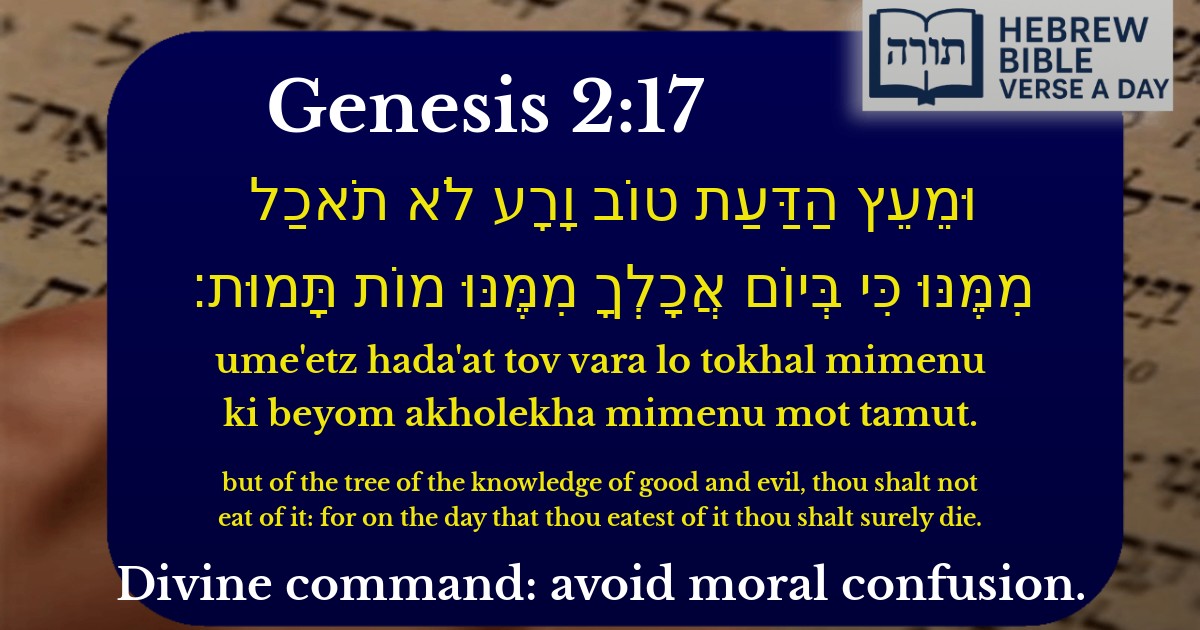Join Our Newsletter To Be Informed When New Videos Are Posted
Join the thousands of fellow Studends who rely on our videos to learn how to read the bible in Hebrew for free!
Hebrew Text
וּמֵעֵץ הַדַּעַת טוֹב וָרָע לֹא תֹאכַל מִמֶּנּוּ כִּי בְּיוֹם אֲכָלְךָ מִמֶּנּוּ מוֹת תָּמוּת׃
English Translation
but of the tree of the knowledge of good and evil, thou shalt not eat of it: for on the day that thou eatest of it thou shalt surely die.
Transliteration
Ume'etz hada'at tov vara lo tokhal mimenu ki beyom akholekha mimenu mot tamut.
Hebrew Leining Text
וּמֵעֵ֗ץ הַדַּ֙עַת֙ ט֣וֹב וָרָ֔ע לֹ֥א תֹאכַ֖ל מִמֶּ֑נּוּ כִּ֗י בְּי֛וֹם אֲכׇלְךָ֥ מִמֶּ֖נּוּ מ֥וֹת תָּמֽוּת׃
וּמֵעֵ֗ץ הַדַּ֙עַת֙ ט֣וֹב וָרָ֔ע לֹ֥א תֹאכַ֖ל מִמֶּ֑נּוּ כִּ֗י בְּי֛וֹם אֲכׇלְךָ֥ מִמֶּ֖נּוּ מ֥וֹת תָּמֽוּת׃
🎵 Listen to leining
Parasha Commentary
📚 Talmud Citations
This verse is quoted in the Talmud.
📖 Sanhedrin 29b
The verse is discussed in the context of the consequences of Adam's transgression and the concept of death as a punishment.
📖 Berakhot 40a
The verse is referenced in a discussion about the nature of the Tree of Knowledge and its implications for human understanding of good and evil.
📖 Eruvin 100b
The verse is mentioned in a broader discussion about the consequences of disobedience to divine commandments.


The Prohibition of the Tree of Knowledge
The verse (Bereishit 2:17) states: "וּמֵעֵץ הַדַּעַת טוֹב וָרָע לֹא תֹאכַל מִמֶּנּוּ כִּי בְּיוֹם אֲכָלְךָ מִמֶּנּוּ מוֹת תָּמוּת" ("but of the tree of the knowledge of good and evil, thou shalt not eat of it: for on the day that thou eatest of it thou shalt surely die"). This commandment is central to understanding the test of Adam and Chava (Eve) in Gan Eden.
Rashi's Explanation
Rashi (Bereishit 2:17) explains that the phrase "מוֹת תָּמוּת" ("thou shalt surely die") implies a double death—both physical death and spiritual death. He notes that Adam was originally created to live eternally, but this transgression introduced mortality into the world. The punishment was not immediate death on that very day, but rather the introduction of the process of dying, as Adam lived for many years afterward (Bereishit 5:5).
Rambam's Perspective
In Moreh Nevuchim (1:2), Rambam discusses the nature of the Tree of Knowledge. He suggests that the tree symbolizes the human capacity for moral discernment—before eating from it, Adam and Chava operated purely on intellectual truth (emmes and sheker), but afterward, they gained subjective moral judgment (tov and ra). The prohibition was thus a test of obedience to Hashem's command over their own reasoning.
Talmudic and Midrashic Insights
The Nature of the Punishment
The phrase "בְּיוֹם אֲכָלְךָ מִמֶּנּוּ מוֹת תָּמוּת" is interpreted in Pirkei DeRabbi Eliezer (13) to mean that Adam was sentenced to death on that day, but Hashem, in His mercy, delayed its execution. This reflects the principle of divine justice tempered with compassion.
Philosophical Implications
The Maharal (Gur Aryeh) explains that the Tree of Knowledge represented the blurring of pure intellect with human desire. Before eating, Adam perceived reality objectively; afterward, his perception became clouded by personal bias. The prohibition was thus a safeguard for spiritual clarity.